UNCTAD Chief Statistician, Mr. Steve MacFeely, in his role as a director of the International Statistical Literacy Programme chaired the Special Topic Session entitled 'The Challenges of Improving Statistical Literacy in Developing Countries' (STS 050). 
Statistical Literacy
UNCTAD Chief Statistician, Mr. Steve MacFeely, in his role as a director of the International Statistical Literacy Programme chaired the Special Topic Session entitled 'The Challenges of Improving Statistical Literacy in Developing Countries' (STS 050). In his opening remarks the growing importance of statistical literacy, explaining that if citizens cannot understand basic descriptive statistics then they cannot fully engage in society and are vulnerable to the adverse effects of 'fake news'. There appears to a 'statistical literacy divide' - looking at the results of the International Statistical Literacy Programme (ISLP) competitions, the winners have been exclusively from the developed world.
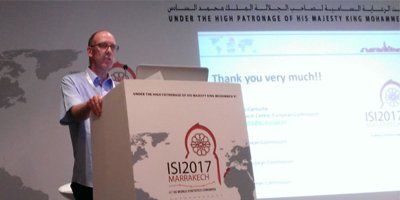
So the challenge facing the ISLP now, is how to assist developing countries in improving statistical literacy. The session comprised a number of excellent speakers: Ms. Betty Gichohi from the Kenyan Revenue Authority, Mr. Afshin Ashoteh from the Iranian Central Bank and Mr. Candido Astrologo from the Philippine Statistical Authority, who outlined the challenges in improving statistical literacy in developing countries.
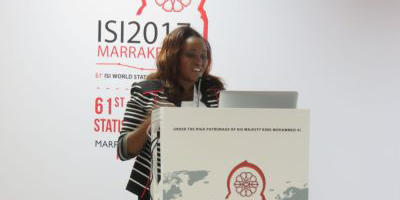
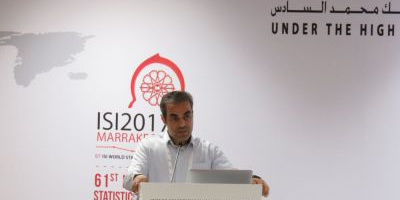
The session enjoyed an expert discussant with Dr. David Stern, Vice-President of the International Association for Statistical Education giving a wide overview of the challenges and also the opportunities for improving statistical literacy in the future.
On behalf of the International Statistical Literacy Programme, Mr. MacFeely also presented the award for 'Best Cooperative Project' to Australia for their project entitled 'The National Schools’ Poster Competition – Australia' at the final awards ceremony.
Trade-in-Services
Mr. MacFeely was also the discussant at Eurostat's Special Topic Session 'Measuring Services Trade in the Globalised World' (Number STS 069). This session included talks by Veijo Ritola - Eurostat, European Commission, Andreas Maurer - World Trade Organisation, Jose Isanta - National Statistical Institute Spain and Jose Rueda-Cantuche - DG Joint Research Centre, European Commission. In his remarks, he highlighted the importance of properly mapping bilateral trade-in-services, trying to capture modes of supply and also understanding better the impact of ICT on trade-in-services. With regard to bilateral trade flows, Mr. MacFeely noted that while the data gaps are significant (in particular for developing countries and most particularly for LDCs - and too many countries remain hidden in the 'rest of the world' residual column in the OECD/WTO TiVA tables), progress is being made.
In this regard he cited the joint UNCTAD-UEMOA project, where a harmonised approach to collecting, processing and disseminating Trade-in-Services statistics is being developed for that West African region. He also noted the particular challenges of compiling statistics on modes of supply, as transaction level data are required. Again, in reference to the joint UNCTAD-UEMOA project, Mr. MacFeely noted that a simplified approach for collecting modes of supply would be used (in line with the 2010 TiS manual) where the dominant mode of supply will be collected. This pioneering project, may in time, be scalable and used in other African regions or in other regions of the world.
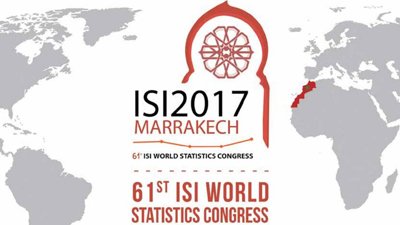
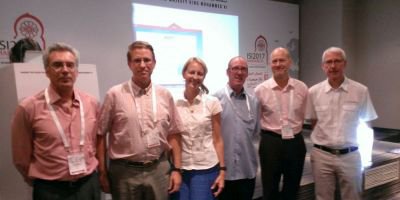
Noting that although we report trade from a macro-national perspective, in reality it is enterprises that trade, not countries, and so he supports the development of micro (or bottom-up) approaches such as STEC (Services Trade by Enterprise Characteristic), whereby we can understand more about the enterprises that trade services.
To maximise the potential of such approaches, Mr. MacFeely emphasised the importance of 'common enterprise identifiers' and 'data infrastructure' highlighted in the Eurostat paper for integrating and linking microdata. Finally Mr. MacFeely stressed the importance of analysing merchandise and services trade together, as often they are directly connected - in fact for some countries, the trade surplus in goods is inseparable from a trade deficit in services, as the same companies that are exporting high-value goods may be purchasing high-value IP licences or management services.
Use of Statistics
Mr. MacFeely was also the discussant at Statistic Finland's Invited Paper Session 'Data users in focus - Statistics in use' (IPS 060). This session included talks by Elaine O'Mahony - Central Statistics Office, Ireland, Emanuele Baldacci - Eurostat, European Commission and Hannele Orjala - Statistics Finland.
In his remarks Mr. MacFeely challenged the idea that customers always know what they want, and instead asserted that National Statistics Offices (NSOs) and other compilers of official statistics have a responsibility to innovate and provide new products. He noted that this perhaps requires a safe space in which to test and refine new ideas.
He also floated the idea that compilers could perhaps place more attention to issues that occupy day-to-day conversations, so in addition to compiling economic statistics, some emphasis could be given to cultural and sports, to attract traffic to our websites and increase our visibility. On the topic of 'fake news' Mr. MacFeely wondered whether compilers of official statistics have some culpability or responsibility for the growth in 'fake news' by not properly explaining complex issues and trends, and by not challenging obvious abuses and misuses of statistics.



